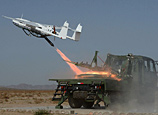
The Qingpu district will be responsible for the application that monitors older people and children, and at least 12,000 Beidou terminals will be put into use by the end of this year, said Zhang Hongzhou, director of Qingpu district's science and technology commission.
By embedding Beidou navigation system chips in mobile phones, watches, school badges and other devices, these facilities will help send alarms and lead to the rescue of children or the elderly during emergencies by providing positioning information about the chip carrier, according to Zhang.
Apart from that, Zhang said they are also trying to develop special apps for the Beidou navigation system.
"The system should be more than a life support; it should also make life more interesting," he added
"Regarding the long history and broad application of GPS globally, it will take a long time for Beidou's own development, but the two systems are compatible rather than rivals," said Yu Wenxian, a professor with Shanghai Jiaotong University.
The key is to make the system stable, with as many services as possible, added Yu.
Ran noted that the Yangtze River Delta region demonstration project comes after the Pearl River Delta one, which was launched last year in May.
The two regions are extremely important, and the Yangtze River Delta will be a good example in the civilian application of the Beidou navigation system nationwide, said Ran.
The Beidou navigation satellite system is a global satellite positioning and communication system developed independently by China.
The system began offering services to customers in the Asia-Pacific region in December 2012. It plans to expand its customer base globally by 2020.

















 Water gush out of Xiaolangdi Reservoir on Yellow River
Water gush out of Xiaolangdi Reservoir on Yellow River


![]()
